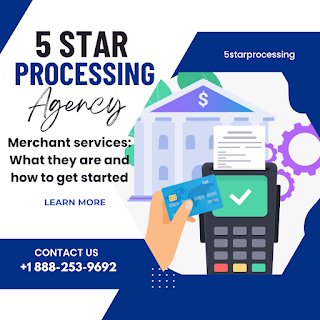Merchant services: What they are and how to get started
Introduction
For many businesses, merchant services are an important part of running a successful operation. Merchant accounts help your business accept payments from customers by providing you with the tools and technology necessary to process credit card transactions. They also have a huge impact on your bottom line—if you’re taking in more cash than before, then that means more profit for you! But what exactly are merchant services? And how do they work? In this guide, we’ll answer those questions and explore how to choose the right provider for your business needs.
What are merchant services?
Merchant services are the tools that allow you to accept credit and debit card payments. In essence, they're a combination of three different components:
- Payment gateway
- Payment processor
- Merchant account
Types of merchant accounts
Merchant account. A merchant account is a bank account that allows you to accept credit card payments.
Credit card processor. A credit card processor receives funds from your customers' credit cards and deposits them into your merchant account, usually through an electronic funds transfer (EFT).
Payment gateway. A payment gateway is a software application that securely transmits sensitive transaction data between the customer's browser and your web server, allowing you to accept online payments directly over the Internet or by phone/fax order forms without needing any additional hardware or software beyond what you already have installed on your website.*
Payment gateway processor. Some merchants choose to use a third-party service provider for these services instead of using their own computers as gateways; these companies are called "payment gateway processors."
Also Read Merchant Account Set Up
How to qualify for a merchant account
To qualify for a merchant account, you will need:
A business license. If your business is registered with the state or local government as an LLC or corporation, then you are already set. If not, it's easy enough to get one online through the appropriate government office (see this guide). You might also want to look into getting certified as an LLC if necessary--it could save time and money down the road!
A business bank account. You'll need somewhere safe where all of your company's funds can be stored securely before they're transferred over into the e-commerce platform's system when customers make purchases online using credit cards; this will likely involve opening up another type of account at another institution entirely (like PayPal) rather than just using whatever was previously there already since those types tend not be compatible with each other very well anymore due to technological advancements over recent years.
Choosing a provider
The first step to choosing a provider is to determine what features you need. Most providers offer the same basic services, but they may vary in the details of their offerings.
For example, some providers have more flexible pricing structures and can accommodate different types of businesses. Others have special offers for new customers or those who sign up for automatic payments or direct deposits. It's important that you find a company that has all the services you need at an affordable price so that your business doesn't suffer financially as it grows over time!
Setting up your processing options
Once you've decided to get a merchant account, the next step is to choose a provider and set up your processing options. You'll need to qualify for a merchant account by meeting certain requirements, such as having an established business with verifiable income and assets, or being able to provide personal guarantees from owners or officers.
Once you've qualified for an account, there are several types of accounts available:
Traditional - This type of account offers unlimited transactions at a fixed monthly cost per transaction (plus additional fees). It's best for businesses that have predictable sales volumes and want consistent monthly payments from their processor.
Merchant services can help your business expand its reach.
So what are merchant services? Simply put, they are a way for your business to accept credit cards as payment for goods and services. Merchant accounts allow customers with credit cards to make purchases without having to physically hand over their card or share sensitive information like the expiration date or CVV code (the three-digit security number on the back of most cards). Instead, all they have to do is enter their name, address and phone number into an online form--and voila! You've got yourself a sale!
Merchant accounts can help your business expand its reach by making it easier for people across America (or around the world) who already carry a credit card in their wallet or purse to buy from you online.
Conclusion
In conclusion, merchant services are a great way to expand your business's reach and make it easier for customers to pay. They can also help your business grow by making it possible for you to accept payments online or through mobile apps. Merchant accounts are available from many different providers, so choose one that best fits your needs as an entrepreneur!
Also read Merchant Account what is it



.png)
Comments
Post a Comment